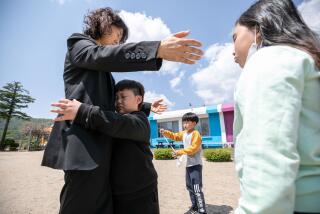Voter apathy rises in S. Korea
- Share via
SEOUL — A small bonus awaited South Koreans who voted in Wednesday’s parliamentary elections at polling stations like the Jae Dong Elementary School in downtown Seoul.
Before voters could leave the classroom-turned-polling station, election worker Lee Jae-gwang would spring to his feet and press a colorful $2 voucher into their hands, a discount for entry to government-run museums, parks and even parking lots.
It was all part of the national election commission’s desperate attempt to encourage South Koreans to vote.
Along with incentives such as the coupons, the commission recruited the Wonder Girls, five teenage pop stars with high-octane dance moves and giggly personalities, for a TV and poster ad campaign aimed at enticing South Koreans to the polls.
It mattered little that only one of the Wonder Girls is 19 and therefore old enough to vote.
Despite the incentives, just 46% of South Korea’s 37 million eligible voters bothered to cast ballots on a rainy election day, the lowest turnout by far since the country held its first genuinely democratic election about 20 years ago.
The low turnout exposed the deep apathy that now characterizes politics in a country that had fought bloody battles to wrest democracy from dictatorship.
Analysts had several explanations for the lack of excitement: no compelling issues, disgust with politicians obsessed with internecine feuds, and fatigue after a long presidential election campaign that concluded in December with the victory of Lee Myung-bak.
Many South Koreans told pollsters that they were now more irritated than attracted by the calls for support that blared from the candidates’ sound trucks.
The voting Wednesday delivered a conservative-controlled parliament that should help Lee push through legislation to promote his pro-growth economic agenda.
“This was a very low-grade fight,” said Cho Gap-je, a former editor of the Chosun Ilbo newspaper’s monthly magazine and a prominent conservative commentator.
“South Korea is now following other advanced democracies where there is always a low turnout.”
The election commission is less sanguine.
Turnout for parliamentary elections fell from 72% in 1992 to 60% in the last vote in 2004, and the commission’s advance polling predicted a further drop this year. Under revisions to the election law, the commission has developed a “voter incentive system,” with $10 million budgeted for a campaign to promote the importance of voting.
The main targets were young South Koreans, who are far more apathetic than their elders.
Banners of the Wonder Girls winking and beckoning people to “Enjoy the Pleasure of Voting” were draped across the gates of polling stations, and TV commercials showed the singers leading a wave of happy, dancing South Koreans off to the polls.
The discount vouchers also bear a picture of the Wonder Girls.
“This phenomenon is a sign that our democracy is in crisis,” said Kim Chong-su, a publisher of political books in Seoul, describing the lack of enthusiasm for elections as a sign of an increased individualism and a breakdown of collective purpose.
The election commission hailed the program as a unique approach to getting out the vote and dismissed suggestions that offering a financial reward could undermine the sense that voting is a civic duty. Voters had mixed views of the vouchers.
“It is our right to vote, but since a lot of people go to cultural events, this could make the voting rate go up,” said Bang Pil-jun, 26, as he left the Jae Dong school with his voucher.
Others who voted at the school expressed doubt that many young South Koreans would be moved to turn up for a mere $2 coupon, and many seemed unaware of the incentive program.
Some voters looked mystified when poll worker Lee handed them the coupons.
A few had to be chased down the hall, where Lee insisted they take their rightful voucher with them.
“I don’t think they advertised it enough,” he said with a wry smile.
Even former editor Cho, a political junkie, said he did not know about the $2 incentive until he voted.
“I take pride in voting, and I wasn’t expecting it when I received that voucher,” he said. “But I look forward to using it.”
--
Special correspondent Jinna Park contributed to this report.
More to Read
Sign up for Essential California
The most important California stories and recommendations in your inbox every morning.
You may occasionally receive promotional content from the Los Angeles Times.













